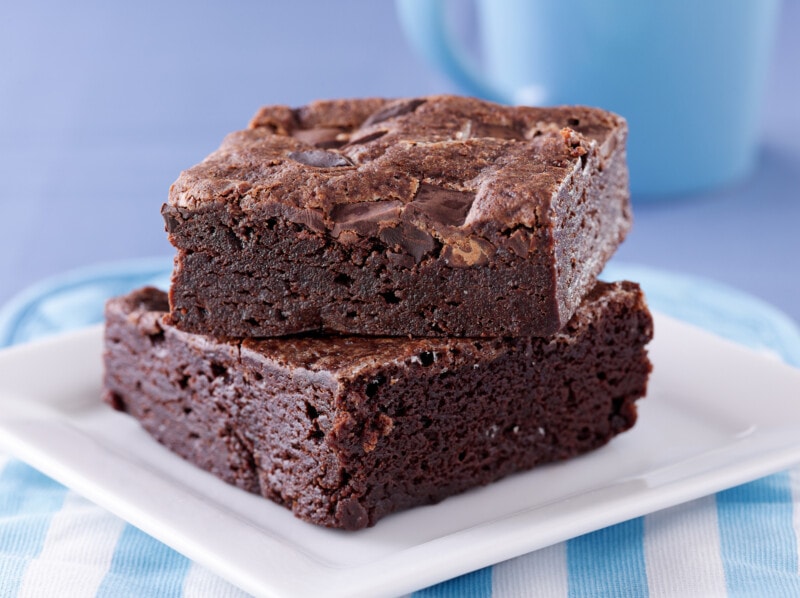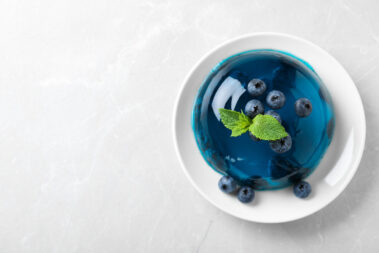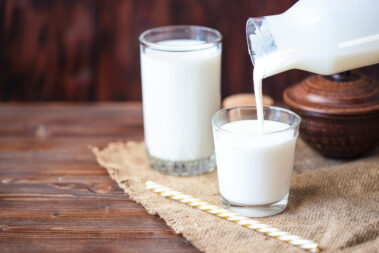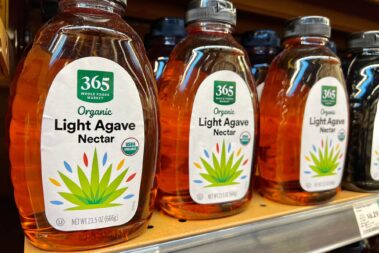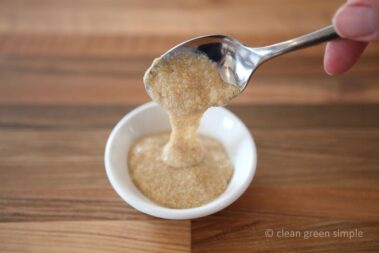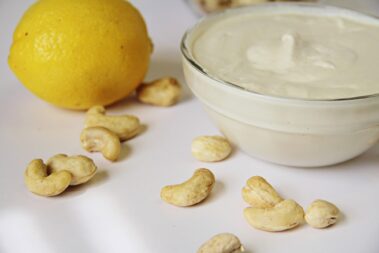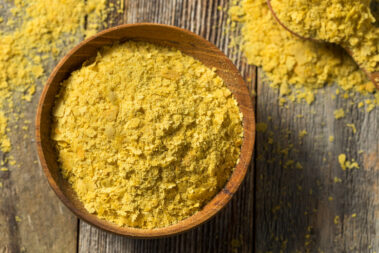Eggs play a central role in most baked goods. They provide the sticky protein-packed glue that holds all the ingredients together. In brownies, they’re especially important for adding moisture and that extra bit of decadence.
But if you’re trying to adhere to a plant-based or vegan diet, you’ll need something else to act as the tasty glue that holds your baked treats together.
To help you create the same delicious desserts, we’ve got the nine best egg substitutes for brownies and other baked goods. These vegan ingredients will all work in a pinch, with a few working so well, you’ll wonder why anyone uses eggs in the first place!
Table of Contents
Why Do Baked Goods Need Eggs (or Something Like Them)?
Eggs play an important role in the baking process. Actually, they play THREE important roles. The trick to finding a worthy egg substitute for your brownie recipe is to use something that can accomplish the same three things.
So what does an egg do?
- Eggs act as an emulsifier. The fat in egg yolks, called lecithin, helps the dry ingredients in a recipe to mix fully with the fats. This allows for a smooth, uniform texture and even cooking.
- Eggs bind the ingredients together and help them rise. The protein in eggs acts as a glue to hold those well-mixed ingredients together. When exposed to heat, small bubbles form in this protein matrix and cause the batter to rise. This leavening process is most important in muffin recipes, but can also make or break your brownies.
- Eggs add a rich flavor profile. All those complex fats and proteins also add to the overall flavor of the baked good. The egg yolks, especially, provide a richness that is hard to emulate.
When we looked for the best egg substitutes for brownies, we kept all three of these aspects in mind.
As you will see from the list below, some options do well to check off one or two of these requirements. A select few were able to accomplish all three and deliver delicious brownies that tasted even better than the original egg-filled version.
The Best Egg Substitutes for Brownies and Baked Goods
The best part about these egg substitutes? Most of them are likely to be readily available in your pantry. So whether you are trying to adhere to a vegan diet or simply ran out of eggs before you started cooking, these substitutes are here to save the day.
1. Carbonated Water
Conversion: ¼ cup carbonated water = 1 egg
Pros:
- Acts as a natural leavener
- Does not change the taste
- Easy to use with a variety of recipes
Cons:
- Does not add richness to the final flavor
- Have to work a little harder to mix things up
One of the most surprising egg substitutes out there is carbonated water―also known as sparkling water. Many chefs swear by this simple hack.
In one respect, it makes perfect sense. Carbonated water already contains the bubbles that help egg-based recipes rise. That makes this simple ingredient the perfect leavener.
It is also tasteless (assuming you opt for a non-flavored variety), which means it can be added to any number of baking recipes.
You will have to spend a little extra time mixing since carbonated water does not have the same emulsifying effects as an egg. Your final product will also lack the richness an egg yolk provides. But, honestly, this isn’t as noticeable as you might expect and can always be overcome by adding a dash more oil or vegan butter.
2. Flaxseed
Conversion: 1 tbsp ground flax + 3 tbsp water = 1 egg
Pros:
- Great binding agent and emulsifier
- Contains protein and fat like an egg
Cons:
- Changes density and texture of the final product
- Adds a bit of an earthy flavor
Flaxseeds are covered in polysaccharides that create a mucilage layer around the seeds when they are exposed to water. By soaking ground flax in water for about 3 to 5 minutes, you can create a viscous substance with a consistency a lot like egg whites.
Like eggs, this gooey substance acts as an emulsifier. It helps mix and bind the ingredients to create moist brownies that don’t crumble apart.
Because flaxseed naturally contains fat and protein, its makeup is more similar to an egg’s than other options on this list.
But flaxseed also contains a lot of fiber, which eggs do not. This factor means that baked goods made with flax eggs tend to be denser, less smooth, and have a nuttier/earthier aftertaste.
3. Chia Seeds
Conversion: 1 tbsp chia + 3 tbsp water = 1 egg
Pros:
- Great binding agent and emulsifier
- Neutral taste
- Contains fat and protein
Cons:
- Can add texture to the final product
- Not a great leavener
Like flaxseeds, chia seeds are lined with a unique type of soluble fiber that reacts with water to create mucilage. The viscous substance that results tends to be even thicker than what you get when you mix flax with water.
This viscous liquid is a fantastic emulsifier that helps create an even mixture of dry and wet ingredients. It also helps to bind everything together for chewy, moist brownies that won’t disappoint.
Chia can be mixed with water in its whole form or after being ground into flour. If you go with the former, expect a different texture in your final product―something like a poppy seed muffin, but not as crunchy.
We recommend using ground chia for brownies rather than whole chia seeds. No matter which form you choose, expect the result to be a bit denser than your typical brownie.
4. Applesauce
Conversion: ¼ cup applesauce = 1 egg
Pros:
- The final product is very moist
- Lower in calories
- Great binding agent
Cons:
- Adds some apple flavor
- Not a great leavener
Applesauce is commonly used as an oil substitute in baked goods. Something about its unique sugar and fiber makeup makes it a great binding agent despite it containing very little fat. It also brings a ton of moisture to the recipes and some added sweetness that really works well for brownies and muffins.
These same characteristics are what make applesauce a decent replacement for eggs in baking recipes.
While it does a great job binding ingredients together, it isn’t much of a leavening agent. It also doesn’t bring much of that indulgent richness that only real fat can provide. But it does give its own unique flavor and added sweetness to baked goods that works really well for some recipes.
5. Banana
Conversion: ¼ mashed banana = 1 egg
Pros:
- Adds a desirable chewy texture to brownies
- Lower in calories
- Great binding agent
Cons:
- The final product is slightly gummy
- Hard to hide the banana flavor
- Not a great leavener
Much like applesauce, mashed bananas work well to replace eggs in a variety of baked goods. They don’t add quite as much moisture as applesauce, but the sticky texture works well as a binding agent.
Bananas are naturally low in fat and protein, which means they don’t work well to make baked goods rise. They are also harder to mix into the recipe and especially difficult to create a smooth product with.
We recommend using only very ripe bananas and beating them until smooth before adding them to your other ingredients. Adding a little extra baking powder or soda to the recipe can help create a fluffier final product as well.
As for the flavor that comes with a ripe banana, that can be hard to hide. So, it is best to only use this egg substitute in recipes that would benefit from a little banana after taste.
6. Vegan Yogurt
Conversion: ¼ cup yogurt = 1 egg
Pros:
- Neutral flavor
- Creates a moist product
Cons:
- Not a great binder
- Not ideal for chewy baked goods
Vegan yogurt is not the best choice for creating hearty brownies, but it does work well as an egg replacer in some recipes.
Yogurt, whether milk-based or vegan, doesn’t have binding qualities. It doesn’t create that gooey texture that eggs do. This means the final baked product will be less dense and chewy. But it will be pleasantly moist.
This combination works well for simple sweet treats like pancakes, waffles, and some kinds of cakes.
If vegan yogurt is the only egg substitute left in your kitchen and you have a craving for brownies, there is still hope. Look for a recipe that uses oat flour or whole wheat flour. These flours have their own binding qualities that can make up for those lacking in yogurt.
7. Aquafaba
Conversion: 3 tbsp of aquafaba = 1 egg
Pros:
- Adds a great chewy texture to brownies
- Great binder and emulsifier
- Similar composition to eggs
Cons:
- Product is drier
- Lacks that rich flavor
Aquafaba is the go-to vegan egg replacer in many savory baked goods and certain sweet dishes. Of everything on this list, it has the closest macronutrient makeup to true eggs.
Like eggs, aquafaba is a great binding agent and emulsifier. When working with this viscous liquid, you’ll feel like you are using real eggs. It is especially good for using in recipes that call only for egg whites.
For recipes that call for whole eggs, using aquafaba gets a little trickier. It doesn’t quite have enough fat or flavor to bring that richness to a pan of brownies. It also tends to dry baked goods out. This is great for biscotti, but not so good for muffins.
Using part aquafaba and part applesauce is a better choice for making brownies and other chewy, moist desserts.
8. Arrowroot Powder
Conversion: 2 tbsp arrowroot + 3 tbsp water = 1 egg
Pros:
- Good thickener
- Neutral flavor
- Great binder
Cons:
- The final product can be a little dry
- Lacks that rich flavor
Arrowroot powder is made from the root of the maranta plant. It has a uniquely high starch content and is somewhat similar in texture to cornstarch. And, much like corn starch, it is a great thickening agent.
While arrowroot powder is good for binding baking ingredients together, it lacks the leavening properties of eggs. It also doesn’t provide the same moist richness as eggs.
Another big challenge with using an arrowroot slurry in place of eggs is that it breaks down at high temperatures. This is one reason arrowroot brownies often come out crumbly and dry.
One hack that has worked well for us is to mix arrowroot with a little applesauce or vegan yogurt.
9. Oil, Baking Powder, and Water
Conversion: 2 tbsp water + 2 tsp baking powder + 1 tsp oil = 1 egg
Pros:
- Uses only pantry staples
- Good leavener and binder
- Creates a moist and chewy end product
Cons:
- Hastens browning/crisping
One of our favorite egg substitutes for brownies is also one of the simplest. By combining oil, baking powder, and water, you get everything an egg provides in one convenient package.
The oil brings the same rich flavor and texture as an egg yolk. Meanwhile, the baking powder adds the leavening power and the water keeps everything moist. When mixed first and then added to the other ingredients, this slurry helps bind everything together.
And, since it has a nice, neutral flavor, this mix works well in just about any recipe.
The only downside we found was that the top layer of our brownies tended to crisp up quicker than they did when eggs were used. I imagine this has something to do with the batter rising more rapidly, causing the top layer to be exposed to heat for a longer period. But, this batch was still one of our favorites and definitely worth a try.
Can You Make Brownies Without Eggs?
Yes, you can make delicious, gooey brownies without eggs. But, as you’ve guessed from our list above, you will need something to replace them.
Substances that are capable of binding the ingredients together, helping the batter rise, and that add a rich but neutral flavor make the best egg substitutes for brownies and other baked goods.
We recommend reaching for the carbonated water or making a water-oil-baking-soda mix as your go-to for creating vegan brownies. But if these items aren’t available, any one of the other substitutes named above will work in a pinch.
- How to Pick the Perfect Watermelon For a Sweet Summer Treat - April 10, 2024
- Future Kind’s Foundations: A Multivitamin Made for Vegans - December 5, 2023
- Does Nutritional Yeast Go Bad? - November 28, 2023

